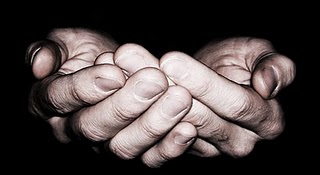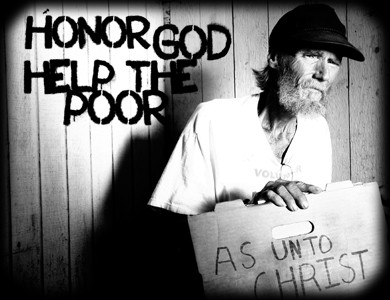
Have you ever noticed how Jesus seems to walk right into traps laid by the Pharisees and religious leaders? Jesus wasn’t dumb, so I sometimes think He stepped into their traps on on purpose. Why? Because usually, their traps used hurting people as the bait. They knew Jesus was a sucker for hurting people.
And Jesus, crazy God-Man that He is, played along, to show us what the heart of God is really like.
One of these instances is in Luke 6:6-11 where Jesus is teaching in a Synagogue on the Sabbath, and a man is present who had a withered hand. Although the text does not say that the Pharisees brought him, the presence of this man in the Synagogue on the Sabbath is still a trap for Jesus, however the man happened to be there that day.
And curiously, Jesus did not have to help this man right there on that day. He really didn’t have it. It wasn’t life threatening. He could have waited until the meeting was over, and then invited the man over for the Sabbath meal, and then after the sun went down, healed the man then. What would have been the harm in that?
Why does Jesus purposefully seem to run headlong into this controversy? Why did He so deliberately and publicly violate some of the Jewish Sabbath traditions?
I think one reason is because it wasn’t just about healing that one man. Jesus also wanted to teach the Pharisees and the other people who were present about the purpose of the Sabbath, and the purpose of God’s Law in general.
Revealing the Heart of God
Jesus wanted to show all the people the heart of God; not just the one man with the withered hand.
And what is the heart of God as revealed in the Law? The Law was given to help people love each other, and treat each other with fairness and respect. It was never intended as a way of barring people from God, or restricting people’s access to God. it was never supposed to be a way to separate the sinners from the righteous.
In many ways, the Law had come to accomplish the opposite of what God had intended. It had become an instrument and tool of death, rather than a means of restoring life and giving health.
This is part of the reason Jesus asks the question in Luke 6:9 about saving a life or destroying it. The Law can be used in either way, and while many religious leaders used it to destroy life, Jesus wanted to show how to use the Law as means of giving life.

How to Help the Poor
And how does Jesus help the man with the withered hand?
He enables the man to help himself. This man wanted his hand back; not a hand out. He was not looking for a free meal or a free bed, but some help getting his feet back underneath him so he could return to work.
This man had been forced to begging, but Jesus was giving back to him his ability to work.
That is how you save a life. That is how you help the poor. You restore their dignity. You treat them as human. You give them the chance to work and provide for themselves and their family.

This post is based on the Grace Commentary for Luke 6:6-11.




“Inasmuch as you have done it unto the least of these, my brethren. You have done it unto Me.” Who is the Lord calling His brethren? Perhaps all involved, eh?
Mark,
Yep! I thought about bringing in this verse, but refrained. Thanks for mentioning it.
Many people I talk to tell me that they help the poor by paying income tax & then the Welfare Dept. helps the poor. However, a LARGE portion (I hear) goes to govt. workers who get LARGE SALERIES & a small portion goes to the poor in the form of a hand out-much at times to be used on luxeries like cigarettes, candy,soft drinks & other things that they would be better off without. To me, a better way is to be self-employed & help unemployed to become self-employed. By using the tips at http://wlferrell.blogspot.com, one can minimize how much inc. tx. they pay(if any) & will be able to help the poor more. We need to try to remember to do ALL we do for the glory of JESUS. ALMOST everyone that drives a vehicle(especially a BIG ONE)is WASTING a lot of fuel & don’t even know it. More info on this at: http://ucangetbettermpg.blogspot.com. So, if you have money to invest why not (if you haven’t already)install a hho generator &(if you have a gasoline eng.)a gasoline vaporizer on your vehicle? You will probably at least double your mpg! Then advertise widely that you will help others get much better mpg for a reasonable amount. Then get as many poor people as needed to help you & pay them cash by the job. That’s what I would do IF I could afford it. If you would like for me to come & preach an evangelistic meeting for you, email me at: wl*******@********il.com.
I agree. The best way to help the poor and restore their dignity is to give them an opportunity to provide for themselves. There are many ways to do this. I think of just one example where our son has been involved in a program that gives micro loans to poor people in a third world country that enables them to start small businesses. Amazingly, many of the businesses allow the owners to provide for themselves. Also, most of the loans are repaid!
Then again, there are those who for health or other reasons are not able to work. Some of us seem to be allergic to giving “handouts”, but sometimes that is necessary. If we have more than enough (yes, I know most of us think we never have enough), we can share. Getting to personally know poor people will allow us to know people who legitimately are needy and unable to provide for themselves, so we won’t need to be concerned that we’re sharing with someone who is just scamming us.
I like the idea of getting to personally know the poor. When we give random handouts to poor people on the street, we never know what their real needs are, or what they are going to do with the money, or if they really need the food.
It is more about a relationship, than making donations. Great point!
That is how you help the poor. Nice work!!
Thanks Steve!
FedEx and I were just having a discussion about this very thing! It really is amazing the power in giving a person simple human dignity by looking them in the eye, learning their name, listening to their story and offering to love them no matter how broken or poor they are. This is not just true of impoverished people, addicts, prostitutes, and those we normally think of, but dignity extended to those who have been terribly wounded by the impossible standards of traditional religion can work wonders in showing people that God is not a tyrant whose expectaions we can never live up to, but a loving Father who takes us as we are.
Right on! Mother Teresa said that when she took care of the sick in Calcutta, she made sure she had love in her eyes. Wow.
We all have to remember that we’re just a heartbeat away from the fates of the poor and homeless, and weak. Lose a job, catch an illness and it all comes down around you. It’s a cruel world and the simple act of truly caring restores so much to people. Jesus is our ultimate example.
Charity and Steve,
Yes, granting dignity and treating others as human beings is a great gift, one that in many ways, science and technology has taken away from us. By restoring dignity and humanity to others, we show them that they are loved and valued.
Michelle,This piece is befatiuul. Isn't it amazing, the way that Word lives, and speaks to us 2000 years later?
I’d like to help many unemployed people by teaching them to build & install hho generators to help people get much better mpg. Details at: http://ucangetbettermpg.blogspot.com.
I totally agree, Jeremy. People used to chide President Reagan for saying that the best social program is a job…..but he was right.
Yes, he was. I am not surprised he said something like this.
In practical terms, we need an overhaul of our legal system. I see many people in prison who I believe sincerely give their hearts to Christ and make a commitment to change their lives around. With assistance from caring individuals on the outside, many actually do make it. Unfortunately, our legal system is such that ex-offenders can only get a pardon after 5 years of being out on the streets! Who can live on nothing for 5 years! Is it any wonder we find so many ex-offenders re-offending?!!! I don’t believe people should necessarily be taken off the hook and get out early, but if they have done their time, have they not paid their debt to society? Why not give them the pardon so that they can seek bonafide work and regain their dignity. Does our legal system make criminals and poor people by design? Hmm.
I live in Canada so my previous comment pertains to Canada but I suspect that the USA has similar problems in its legal system.
Doug,
I have a a “behind closed doors” perspective of our legal system here in the US, and I can say that for the most part, we are not doing anyone any favors with our justice system. It makes some crimes legal, and then harshly punishes other crimes, and then does nothing to help those who have been judged guilty, and in the process of trying to help them, only robs the tax payers of more money.
To a certain extent, I agree. That is, offences have to be punished with a sense of fairness: lesser crimes carrying lighter sentences that more serious ones. This is humanly speaking, of course, because all sin/crime in God’s eyes deserves eternal capital punishment … even lying about how good last night’s supper was! Such a severe penalty leaves room for God’s grace and mercy (totally underserved) for those who believe in Jesus sacrificial death on the cross at Calvary and His redemptive resurrection.
The article, “Why America Locks up Too Many People,” in the Economist, (Sep. 17, 2010, I can send you a pdf, if you are interested), mentions that nearly one in 100 Americans is behind bars! That’s a six times higher rate than in Canada. It addresses some of the ridiculous crimes you were alluding to.
The reality is that prison is very expensive ($80-$120K per year per inmate) and typically comes with a high, 60-80% recidivism rate. It clearly fails its purpose of “correction” and generally creates only more hardened criminal who will one day roam the streets once again. No one in their right mind would go to a doctor who could only fix his patients problems 20% of the time.
On the other hand, programs like M.A.P. (Mentorship-Aftercare-Presence, see http://www.mapottawa.ca) keep recidivism down to about 20%! That, coupled with restorative justice programs (where ex-offenders who come to the point of remorse for their crimes can exchange apologies with their victims, if the victims wish to entertain such meetings), has been very successful in limiting re-offences and reducing lingering fear among the victimized public.
The point is, I have no problem with locking up criminals for a reasonable time with no early graces. However, when they have served their time, society should be Christ-like and be willing to cautiously bring them back into the fold. This includes allowing them to work (receive a pardon) early so that they can contribute positively to society.
There is, however, a segment of the prison population that will remain dangerous to society but that is where psychiatrists and the like need to be actively involved. My experience to-date has been that pathological criminals are in the minority of the prison population.
Our society is only as strong as its willingness to lift up its weakest members.
Sorry the link for Map Ottawa is http://www.mapottawa.com
Doug,
I agree with pretty much everything you say.
There is a great “experiment” in New Zealand called “Restorative Justice” which I think would help reduce the recidivism rate here in the US and cut back on the expenses of prisons.
We have a restorative justice program operating here in Ottawa.
I believe that there are many innocent people in prison because of unjust judges & because most people don’t know the info. here: http://justicesecrets.blogspot.com. Many people are suffering & dying needlessly because they don’t know the info. here: http://exciting-solutions.blogspot.com.
I don’t doubt that some judges are unjust. It’s a sad reality of being human. Nevertheless, some knowledge is a good thing. We are called to live holy lives that honour Christ and sometimes doing so may mean we get put in jail/persecuted (like Joseph, Daniel and a host of other biblical examples, including Jesus himself. Honesty is still the best policy.
Here is an awesome documentary (1:28 in length), called “A Hard Name”. It takes a real good and deep look at what may be under the hard shell of a criminal. It is very moving and well worth the watching.
http://ww3.tvo.org/video/164576/hard-name
MAP Ottawa has undergone rebranding. It’s new website is: http://www.mapreintegration.ca/
I am not seeing a direct connection between your scripture passage and your twitter title ‘Free handouts and redistibution of wealth don’t always help the poor. Jesus showed a better way.’ In my opinion, the problematic word is ‘always.’ I live in a poor neighborhood. You can affirm dignity all day but there has to be a ‘work’ to go with the ‘faith.’ Yes, I agree as believers we should have a relationship with poor. They are our neighbors, not projects. Perhaps you don’t redistribute wealth but you provide an opportunity for an educational class, a job posting (you take them to the interview), or figure out where the assistance programs are. You’re posting is almost like, ‘I know you’re not a homeless drug addict because you’re a real person named ‘Greg.’ Now ‘GO’ and get your house, education, and substance abuse clean, because I ‘see’ you.
I’ll speak for my neighborhood in America. It’s far from just affirming dignity, it’s also a form of discipleship where I’m going to walk along aside till you see the opportunity and help you take it.